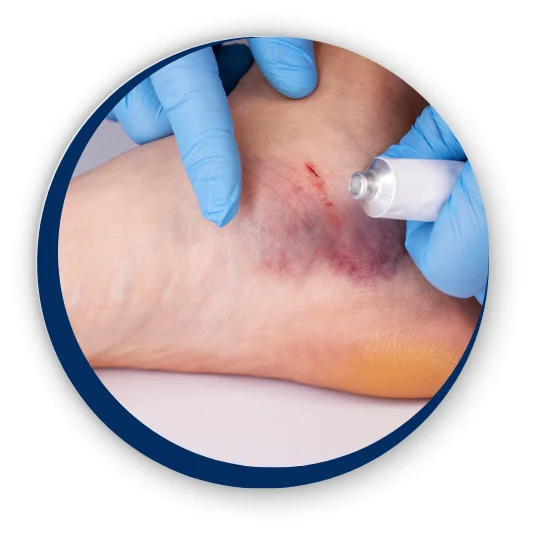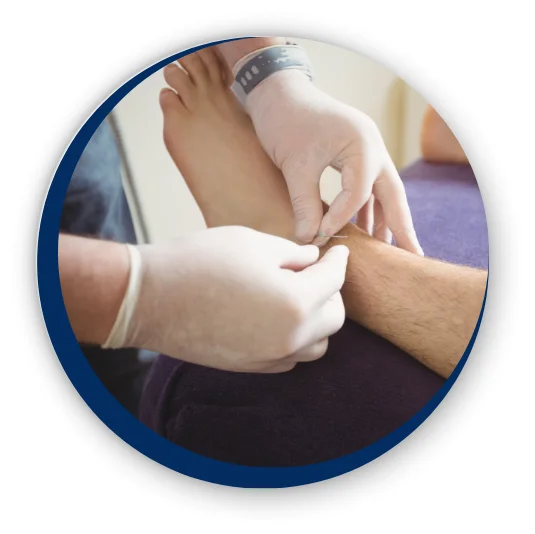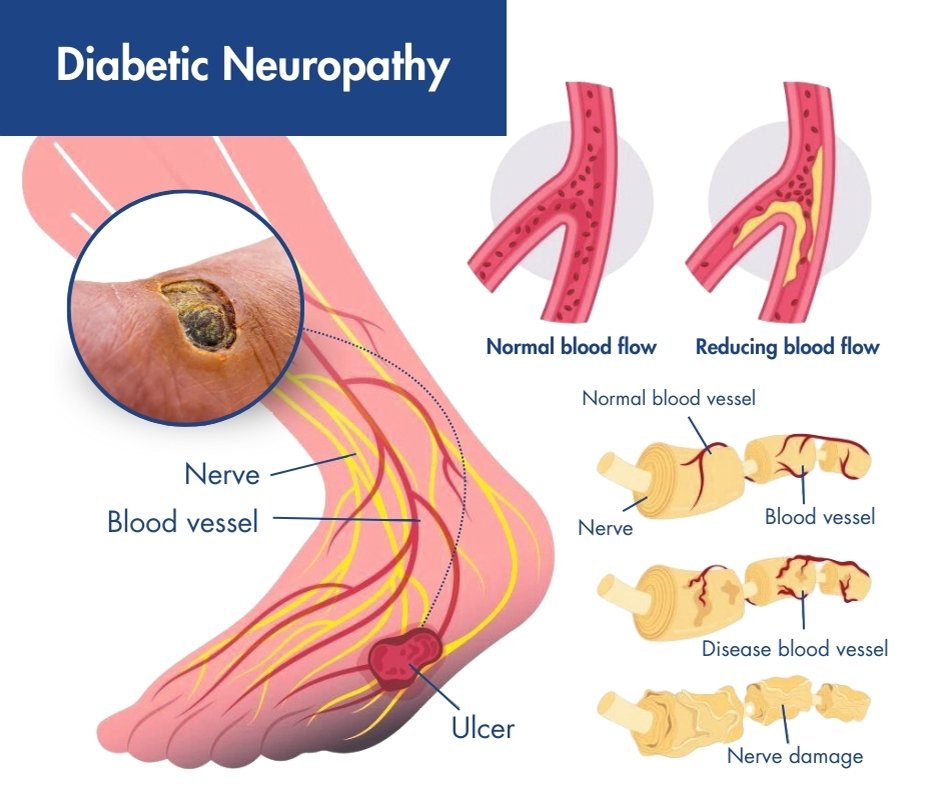A Vascular Doppler test helps detect blood flow issues in diabetic patients. It identifies early signs of vessel damage, poor circulation, or blockages, helping prevent serious complications like ulcers or amputations.
Diabetic Neuropathy Treatment in Mumbai
What Is Diabetic Peripheral Neuropathy?
Diabetic Peripheral Neuropathy is a condition that affects people with diabetes. It happens when high blood sugar levels damage the nerves, especially in the legs and feet. This nerve damage causes symptoms like tingling, burning, numbness, or pain. Over time, it can make it hard to feel injuries, which may lead to serious foot problems like ulcers or infections.
At VRX Healthcare, our diabetic neuropathy specialists understand how this condition affects your daily life. That’s why we offer personalized treatment for diabetic neuropathy in Mumbai, using modern therapies and a caring approach.
If you’re feeling numbness, burning, or unusual pain in your feet, it’s important to seek early care. We provide effective diabetic neuropathy treatment in Mumbai to help you manage symptoms and prevent complications.
Common Symptoms of Diabetic Peripheral Neuropathy
If you are living with diabetic peripheral neuropathy, you may notice several symptoms that impact different areas of your body—most commonly your feet and hands. Consulting diabetic neuropathy specialists can help you manage these symptoms effectively and prevent further complications.
- Burning or Sharp Pain: You may feel a burning, stabbing, or shooting pain, often in your feet, legs, or hands.
- Numbness: You might lose sensation or feel less in certain areas, especially in your feet or hands.
- Tingling Feeling: Many people describe it as "pins and needles" in the hands or feet.
- Muscle Weakness: Your muscles may feel weak, making it harder to walk or do daily tasks.
- Balance Problems: Loss of feeling in your feet can make it hard to keep your balance and increase the risk of falling.
- Digestive Issues: You might have trouble swallowing, feel nauseous, or have irregular bowel movements.
- Heart-Related Problems: Diabetic neuropathy may increase your risk of heart attack or stroke.
- Urinary Problems: Some people have trouble urinating or may experience urine leakage (incontinence).
Causes and Options for Diabetic Neuropathy Treatment in Mumbai
Diabetic peripheral neuropathy is mainly caused by long-term high blood sugar levels that gradually damage the nerves. Several factors contribute to this condition, including:
- Poorly Controlled Blood Sugar: Constantly high glucose levels can hurt your nerves and reduce blood flow, leading to serious nerve damage.
- Chronic Inflammation: Diabetes-related inflammation can affect nerves and nearby tissues.
- Oxidative Stress: High sugar levels can create harmful molecules called free radicals, which damage nerve cells.
- Reduced Blood Circulation: Diabetes can limit blood flow to the nerves, cutting off the oxygen and nutrients they need to stay healthy.
- Unhealthy Lifestyle Habits: Being overweight, smoking, or not getting enough physical activity can increase the risk of nerve damage.
- Living with Diabetes for a Long Time: The longer you have diabetes, the greater your chances of developing peripheral neuropathy.
Understanding these causes shows why it’s so important to manage your diabetes properly. Regular blood sugar checks, a healthy lifestyle, and prompt medical care can go a long way in preventing or delaying nerve damage.


Role of a Diabetic Neuropathy Specialist
Diabetic neuropathy requires expert care, and our specialists are here to help. They diagnose and manage nerve damage caused by diabetes, offering treatments to relieve symptoms like pain, tingling, numbness, and mobility issues—improving your comfort and quality of life.
Get A Quote
Book an Appointment
Modern Approaches to Diabetic Foot Treatment in Mumbai – VRX Healthcare

Foot Risk Assessment
Full check-up including nerve tests, blood flow (ABI), and foot structure evaluation.

Specialist Foot Care
Professional removal of corns, treatment for infections, and diabetic foot management to avoid ulcers.

Patient Education
Daily self-inspection tips to prevent complications and maintain foot health.
Neuropathy Management
Expert care for pain, numbness, and mobility issues caused by diabetic nerve damage.

Footwear Advice
Guidance on proper diabetic footwear for support and protection.

Regular Follow-ups
Continued care from certified specialists to ensure long-term foot health.
Take the First Step Towards Healthier Feet
Don’t let diabetic neuropathy affect your quality of life. Book your consultation with VRX Healthcare today and get expert care tailored to your needs.
Diagnostic Tests for Diabetic Peripheral Neuropathy in Mumbai
At VRX Healthcare, we offer a comprehensive range of diagnostic tests to accurately assess diabetic peripheral neuropathy and related vascular conditions. These tests help us detect nerve damage early and design an effective treatment plan tailored to each patient.
This test checks for the ability to feel pressure on specific points of the feet. Using specialized monofilaments, we evaluate the patient’s response at various points, and results are marked on a foot diagram. It helps identify areas at risk for ulceration or unnoticed injury due to lost sensation.
A sensitometer is used to measure the VPT by applying an electrical voltage to the soles of the feet. The threshold at which the patient begins to feel the vibration helps determine the extent of nerve damage.
This evaluates the ability to detect changes in temperature on the feet. Impaired temperature sensation can increase the risk of burns or injuries from heat or cold, as patients may not perceive the danger in time.
Burning, stinging, or aching pain is evaluated using the Total Symptom Score (TSS). This helps determine the intensity of sensory discomfort and guides treatment options for neuropathic pain management.
The reflexes in the ankle are tested by tapping the tendon and observing movement. Absent or weakened reflexes may indicate motor nerve involvement and are commonly seen in advanced diabetic neuropathy.
The Podia scan identifies structural abnormalities and high-pressure points on the soles of the feet. It is especially useful in understanding foot mechanics and helps in preventing abnormal gait or posture, which can lead to non-healing foot ulcers.
- ABI (Ankle-Brachial Index): Measures blood pressure in the ankles compared to the arms to detect large artery blockages.
- TBI (Toe-Brachial Index): Focuses on smaller blood vessels in the toes and is particularly effective for patients with arterial calcification, where ABI alone may not be reliable.
This non-invasive test measures the amount of oxygen available in skin tissues. Low TcPO₂ levels indicate poor blood circulation and a higher risk of foot ulcers or amputation. It is a valuable tool in determining wound healing potential and severity of peripheral artery disease.

Frequently Asked Questions
Diabetic peripheral neuropathy is a nerve damage problem caused by high blood sugar levels. It usually affects the feet and legs first, and then the hands. Common symptoms include pain, numbness, tingling, and weakness.
Testing helps find early signs of nerve damage. Early diagnosis can help control symptoms, prevent serious foot problems, and improve your quality of life.
You can get complete diabetic neuropathy diagnostic tests in Mumbai at VRX Healthcare. Our clinic offers modern and painless testing methods to check for nerve and blood flow problems.
Tests include:
- Vibration test with tuning fork
- Pressure sensation test
- Pain and temperature tests
- Ankle reflex test
- Vascular Doppler and ABI/TBI
- Podia scan and TcPO₂ test
These tests check your nerve health and blood circulation.
No, most of the tests are non-invasive and painless. They are designed to check your nerve and foot health in a safe and comfortable way.
The full testing process usually takes 30 to 60 minutes, depending on your symptoms and the number of tests needed.
After the tests, the doctor will explain the results and suggest a treatment plan if needed. You may also receive tips for foot care and lifestyle changes.
Yes. Early detection through tests can help prevent non-healing foot ulcers, infections, and even amputations by guiding proper care and footwear choices.
While nerve damage can’t always be reversed, it can be managed well with proper care, blood sugar control, medications, and regular foot checks.
